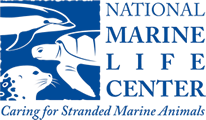3 Seals are Heading Back to the Wild!
It’s time to celebrate! The National Marine Life Center is releasing three rehabilitated seals tomorrow morning, Friday, September 12, at 10:00 am at Scusset Beach, and the public is invited to observe the release.
 “Barclay” is a male harbor seal pup that stranded in Maine on May 18, 2014. He was rescued by Marine Mammals of Maine and brought to the National Marine Life Center on May 19. He was treated for dehydration, malnourishment, bite wounds of unknown origin, and maternal separation. In celebration of the 100th anniversary of the Cape Cod Canal, Barclay was named after William Barclay Parsons, the Chief Engineer who built the Canal.
“Barclay” is a male harbor seal pup that stranded in Maine on May 18, 2014. He was rescued by Marine Mammals of Maine and brought to the National Marine Life Center on May 19. He was treated for dehydration, malnourishment, bite wounds of unknown origin, and maternal separation. In celebration of the 100th anniversary of the Cape Cod Canal, Barclay was named after William Barclay Parsons, the Chief Engineer who built the Canal.
“Rose” is a female harbor seal pup that stranded on Star Island, NH on June 6, 2014. She was rescued by the Seacoast Science Center and admitted to the National Marine Life Center on June 10. She was treated for dehydration, malnourishment, and maternal separation. Rose was named after the Rose Standish, the first ship to travel through the newly built Cape Cod Canal.
We suspect human activity near Barclay and Rose scared each pup’s mom away. Sadly, this is a common occurrence with harbor seal pups. Their moms leave them on the beach in order to go offshore and hunt for food. This is normal behavior; the pups are perfectly healthy and know to wait for their moms to return. Unfortunately, when people see the pup they think it’s been abandoned so they handle it, move it, or scare it into the water. Then, when mom returns, she can’t find her pup.
You can help by letting people know about this natural behavior, by reminding friends and family to stay away from seal pups, and by calling an authorized stranding organization if you see a seal on the beach.
“Mary Arnold” is a juvenile female grey seal that stranded in Truro, MA on July 11, 2014. She was rescued by the International Fund for Animal Welfare and admitted to the National Marine Life Center the same day. She was treated for alopecia (abnormal hair loss), infection, and multiple minor wounds. She is the largest seal that the Center has treated to date. Mary Arnold was named after the tug boat used to haul granite to build the Cape Cod Canal.
Release Details:
- When: Friday, September 12, 2014
- Time: 10:00 am
- Where: Scusset Beach State Reserve, 20 Scusset Beach Road, Sandwich, MA
The next sick or injured seal needs your help! Feeding a seal costs at least $5/day. A week of fluids for rehydration costs $25. A course of antibiotics can cost $50. Your support saves the lives of these amazing animals. Please, give generously today.
Click here to make a secure, on-line donation.
Click here to view our wishlist.
On behalf of Barclay, Rose, and Mary Arnold, thank you.








